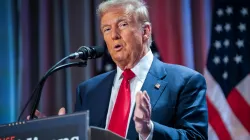Musk effect: Donald Trump's changes stance on H-1B visa programme, affirms support, calling it 'great'
Trump's latest shift in stance comes as major divide emerged within his MAGA team in the United States. Musk and Ramaswamy, both foreign-origin leaders, heading Trump's Department of Government Efficiency (DOGE) seem to have reignited the debate.

In what can be termed a major shift in stance, US President-elect Donald Trump extended his support to the H-1B visa programme, terming it 'great'. Trump, who called himself a 'believer in H-1B visa' in a telephonic interview with the New York Post, further added, "I have many H-1B visas on my properties. I have used it many times. It's a great programme."
In his first term, Trump's administration had imposed restrictions on H-1B visas, citing concerns over "abuse" and "economic strain."
In 2016, Trump condemned the programme as he described it as a means employed by companies to replace American workers with lower-paid foreign employees. In the wake of economic challenges caused by the Covid-19 pandemic, restrictions were further intensified.
Why has Trump changed stance?
Trump's latest change in stance can be attributed to a major divide that emerged within his MAGA team in the United States, as Elon Musk and Vivek Ramaswamy who advocated for the expansion of the visa program for 'highly skilled workers' faced heavy backlash from within President-elect's base.
Musk and Ramaswamy, both foreign-origin leaders, who are heading Trump's Department of Government Efficiency (DOGE) seem to have reignited the debate on H-1B visas while reflecting a divide over immigration policy as Trump is set to assume presidency.
The debate over H1B visas and immigration policy has intensified following Trump's announcement of Sriram Krishnan as the White House policy adviser on artificial intelligence. Krishnan has previously supported removing per-country caps for green cards, a stance that has sparked mixed reactions.
While some Trump supporters back this approach, citing its potential to fill critical gaps in the tech workforce, others see it as conflicting with the administration's broader immigration goals.
The H1B visa debate has exposed deeper divides in US immigration policy, particularly regarding the balance between skilled immigration and domestic workforce development. With Indian workers comprising 72 per cent of H1B recipients in fiscal year 2023, this issue also has implications for US-India relations.
(With agency inputs)
Also Read | Yearender 2024: What does Trump's return mean for world- tariffs, mass deportations and nightmare for Canada